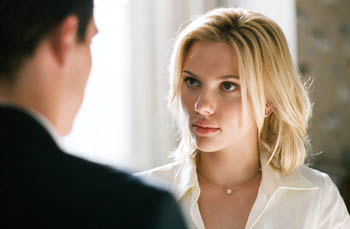![[Metroactive Movies]](/movies/gifs/movies468.gif)
[ Movies Index | Show Times | Silicon Valley | Metroactive Home | Archives ]

Photograph by Clive Coote Man-Killer: Scarlett Johansson plays a migraine-prone troublemaker in 'Match Point.' The Racket Rising tennis pro meets descending actress in 'Match Point,' Woody Allen's sober new melodrama AS THE REALTORS would have it, location is everything. Woody Allen's Match Point shows how much can be gained by a change of venue. This much-praised new film shows us the basic romantic love triangle gone fatal. It is not exactly a breakthrough. Then again, Allen's underrated films (like his last, Melinda and Melinda) are invariably followed by overrated ones. Still, no doubt a big part of Match Point's appeal comes from the sense of Allen connecting to an old source of energy: his feelings about being a Jew in the midst of a WASP hierarchy. He has changed the faces and the places, but the story here feels deeper, echoing old hurts, old snubs. The film's anti-hero is a striving Irish émigré, Chris (Jonathan Rhys-Meyers), a tennis pro turned country-club instructor. He has come to London to climb, forcing himself through the rigors of high culture. When, over cocktails, he uses the word "austere" to describe his own father—an oil rigger rendered a double amputee in an accident—he doesn't even wince. Chris enjoys an easy climb up—or rather, aboard—his student, Chloe (Emily Mortimer). Soon, he marries into her wealthy family. The paterfamilias is a cozy, indulgent old gent (Brian Cox). Cox coasts along pleasantly, but one feels sorry for Mortimer. This eminently sparkly and eager Scots actress is made into a frump with slumped shoulders and untidy hair. Her overenthusiasm is the biggest strike against her. Allen means for us to see her as particularly ordinary when contrasted with the girl affianced to Chloe's brother, Tom (Matthew Goode, basically Hugh Grant Jr.). Scarlett Johansson plays Tom's fiancee, Nola. "Scarlett Johansson"—now, there's a name Allen could have cooked up in one of his comedies, once upon a time. The word "No" in Nola's name should have warned Chris. She is a migraine-prone troublemaker, an actress from Colorado whose chances in London are dwindling. The film introduces her holding a pingpong paddle and asking, "Who's my next victim?" Almost instantaneously, Chris is trading Raymond Chandler�style quips with this man-killer. An affair progresses faster than either could have expected. Throughout, Johansson is reliably the weakest link. When describing her wretched past (drugged, "lost" sister; drunk mom), we have trouble believing a word she's saying. Who could have played the part of Nola and made it work? Maybe no one alive today. Nola is an old-movie siren in a contemporary set piece. Ava Gardner or Barbara Stanwyck might have made these lines ring, could have looked right while getting their blouses wrestled off in the rain. With her pillowy mouth and flat, weary diction, Johansson makes a good physical match for Rhys-Meyers, a male ingénue. The plot resembles that of Crimes and Misdemeanors, Allen's drama about how fate rewards the unrighteous. Chris' first line is "The man who said, 'I'd rather be lucky than good,' saw deeply into life." Astonishing, isn't it—the suggestion that Allen still believes that it was luck, rather than digging in, that got him where he is. It all shows how deep runs his sense of inadequacy. Chris takes a harsher line later: "Faith is the path of least resistance." That is a darker way of putting a famous Crimes and Misdemeanors line: "God doesn't play dice with the universe—only hide and seek." Now, if Allen had only put that slighting thought about faith into the mouth of someone who was leading an ethical life. Allen breaks no new ground in drama by having that godless line of dialogue issuing from a character who behaves as ruthlessly as Raskolnikov. In the end, it must be the locations that have earned Match Point so much praise. Because he is such a connoisseur of cinematographers, Allen's eye never gets the credit it deserves. Gordon Willis' art deco Manhattan is a different place than Zhao Fei's city of humid storefronts in Small Time Crooks. Yet in both cases it is framing and emphasis that change the mood from high-rent midtown to swampy Battery. Cinematographer Remi Adefarasin is adept at filming in English light. The richer London districts look like elegance without fuss. What American doesn't feel inadequate in the face of the accents, those homes? The surroundings inflame Allen's nervous, paranoid side—the inside fear of an ambitious lad that he'll overreach. Obviously, there is a lot of Allen in Chris. Even an atheist can worry about being struck down for pushiness and vulgarity. Allen is a foreigner here, though. He can't figure out what constitutes a bad London neighborhood, and Scotland Yard detectives operate like Lestrade's grandchildren, with no sign of Sherlock Holmes anywhere. But Match Point is compelling in that Allen seems to be rediscovering the unease that made him world famous.
Match Point (R; 124 min.), directed and written by Woody Allen, photographed by Remi Adefarasin and starring Scarlett Johansson and Jonathan Rhys-Meyers, opens Friday at selected theaters.
Send a letter to the editor about this story to letters@metronews.com. [ Silicon Valley | Metroactive Home | Archives ]
|
From the January 4-10, 2006 issue of Metro, Silicon Valley's Weekly Newspaper.
Copyright © 2006 Metro Publishing Inc. Metroactive is affiliated with the Boulevards Network.
For more information about the San Jose/Silicon Valley area, visit sanjose.com.